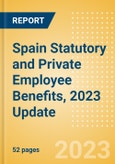The Spanish social security system covers the country's entire population, including foreigners who work in the country. It also protects those of Spanish origin, as well as their dependents who reside in foreign countries. The main objective of this system is to formulate a single and integrated model of social protection, in order to guarantee adequate social assistance and a source of funds for various benefits, with contributions from insured individuals, employers, and the state. However, the recent sovereign debt crisis in Europe has adversely impacted the Spanish social security system. The recession in property dealings affected Spain's property and housing sector and thus raised the level of unemployment. As a result of this, the payment of unemployment benefits has increased, rising government expenditure, and forcing the state to impose high taxes and charges for all free medical and healthcare services. Furthermore, the country's private employee benefits sector was also adversely affected by the crisis.
Key Highlights
- The National Social Security Institute - INSS, The Social Marine Institute - ISM, The Institute for Elderly and Social Services - IMSERSO, The State Public Employment Service - SPEE, and The General Treasury Social Security - TGSS are responsible for the functioning of the overall social security system.
- A person's national insurance contribution is determined based on their income.
- An insured person who is unemployed or unable to work and whose benefits have been exhausted is entitled to a credited contribution.
- In Spain, employers provide voluntary retirement benefits to their employees through DC plans or hybrid plans.
Scope
This report provides a detailed analysis of employee benefits in Spain:
- It offers a detailed analysis of the key government-sponsored employee benefits, along with private benefits
- It covers an exhaustive list of employee benefits, including retirement benefits, death in service, long-term disability benefits, medical benefits, workmen's compensation insurance, maternity and paternity benefits, family benefits, unemployment benefits, minimum resources benefit, leaves and holidays and private benefits
- It highlights the economic and regulatory situations relating to employee benefits in Spain
Reasons to Buy
- Make strategic decisions using in-depth information related to employee benefits in the country
- Assess employee benefits of the market, including state and compulsory benefits and private benefits
- Gain insights into the key employee benefit schemes offered by private employers in the country
- Gain insights into key organizations governing employee benefits market, and their impact on companies








